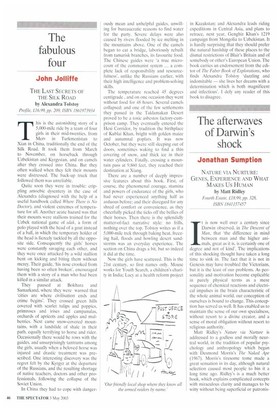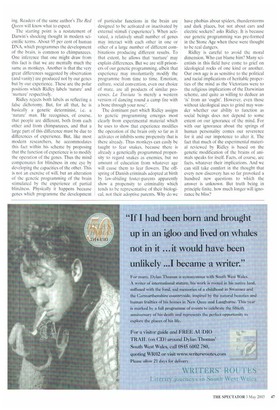The afterwaves of Darwin's shock
Jonathan Sumption
NATURE VIA NURTURE: GENES, EXPERIENCE AND WHAT MAKES US HUMAN by Matt Ridley Fourth Estate, £18.99, pp. 328, ISBN 1841157457 1 t is now well over a century since Darwin observed, in The Descent of Man, that 'the difference in mind between man and the higher animals, great as it is, is certainly one of degree and not of kind'. The implications of this shocking thought have taken a long time to sink in. The fact that it is not in Genesis may have troubled the Victorians, but it is the least of our problems. As personality and motivation become explicable in purely physical terms as a mere sequence of chemical reactions and electrical impulses in the brain characteristic of the whole animal world, our conception of ourselves is bound to change. This conception has served us well. It has enabled us to maintain the sense of our own specialness, without resort to a divine creator, and a sense of moral obligation without resort to religious authority.
Matt Ridley's Nature via Nurture is addressed to a godless and morally neurtral world, in the tradition of popular psychology and anthropology which began with Desmond Morris's The Naked Ape (1967). Morris's tiresome tome made a great sensation in its day, although natural selection caused most people to bin it a long time ago. Ridley's is a much better book, which explains complicated concepts with miraculous clarity and manages to be Witty without being superficial or patronis ing. Readers of the same author's The Red Queen will know what to expect.
The starting point is a restatement of Darwin's shocking thought in modern scientific terms. About 95 per cent of human DNA, which programmes the development of the brain, is common to chimpanzees. One inference that one might draw from this fact is that we are mentally much the same as monkeys. Another is that the very great differences suggested by observation (and vanity) are produced not by our genes but by our experience. These are the polar positions which Ridley labels 'nature' and 'nurture' respectively.
Ridley rejects both labels as reflecting a false dichotomy. But, for all that, he is basically a genetic determinist, i.e. a 'nature' man. He recognises, of course, that people are different, both from each other and from chimpanzees, and that a large part of this difference must be due to differences of experience. But, like most modern researchers, he accommodates this fact within his scheme by proposing that the function of experience is to modify the operation of the genes. Thus the mind compensates for blindness in one eye by developing the capacities of the other. This is not an exercise of will, but an alteration of the genetic programming of the brain stimulated by the experience of partial blindness. Physically it happens because genes which programme the development of particular functions in the brain are designed to be activated or inactivated by external stimuli ('experience'). When activated, a relatively small number of genes may interact with each other in one or other of a large number of different combinations producing different results. To that extent, he allows that 'nurture' may explain differences. But we are still prisoners of our genetic programming, albeit that experience may involuntarily modify the programme from time to time. Emotion, culture, social convention, even our choice of mate, are all products of similar processes. La Travicaa 'is merely a western version of dancing round a camp fire with a bone through your nose'.
The dominant part which Ridley assigns to genetic programming emerges most clearly from experimental material which he uses to show that experience modifies the operation of the brain only so far as it activates or inhibits some propensity that is there already. Thus monkeys can easily be taught to fear snakes, because there is already a genetically programmed propensity to regard snakes as enemies, but no amount of education from whatever age will cause them to fear flowers. The offspring of Danish criminals adopted at birth by law-abiding foster-parents apparently show a propensity to criminality which tends to be representative of their biological, not their adoptive parents. Why do we have phobias about spiders, thunderstorms and dark places, but not about cars and electric sockets? asks Ridley. It is because our genetic programming was pre-formed in the Stone Age when these were thought to be real dangers.
Ridley is careful to avoid the moral dimension. Who can blame him? Many scientists in this field have come to grief on ideological rocks of one kind or another. Our own age is as sensitive to the political and racial implications of heritable properties of the mind as the Victorians were to the religious implications of the Darwinian scheme, and quite as willing to deduce an 'is' from an 'ought'. However, even those without ideological axes to grind may wonder whether our ability to function as social beings does not depend to some extent on our ignorance of the mind. For with our ignorance about the springs of human personality comes our reverence for it and our impotence to alter it. The fact that much of the experimental material reviewed by Ridley is based on the genetic modification of the brains of animals speaks for itself. Facts, of course, are facts, whatever their implications. And we can still take comfort in the thought that every new discovery has so far provoked a hundred new questions to which the answer is unknown. But truth being in principle finite, how much longer will ignorance be bliss?











































































 Previous page
Previous page